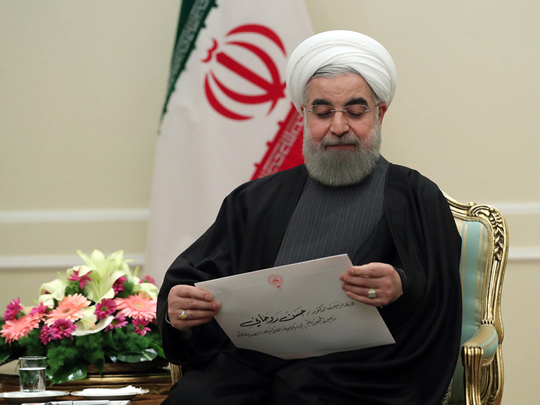
Riyadh: Kuwait has welcomed Iran’s willingness for dialogue with its Gulf Arab neighbours, saying any talks are likely to help resolve civil wars in Syria and Yemen, according to Kuwaiti state news agency KUNA.
Iran and US ally Saudi Arabia, which is the main member of the Gulf Cooperation Council (GCC), back opposite sides in Syria and Yemen. US President Donald Trump has added extra strain by ratcheting up pressure on Iran over its missile programme.
Saudi Arabia and other members of the GCC accuse Iran of using sectarianism to interfere in Arab countries and expand its sphere of influence in the Middle East.
Kuwaiti Deputy Foreign Minister Khalid Al Jarallah, responding to Iranian Foreign Minister Mohammad Javad Zarif’s comments that his country was ready for dialogue with the GCC, said: “It’s what we’re looking for”.
Such a dialogue would “contribute effectively to containment of many areas of tension in the region, whether in Yemen or in Syria or anywhere else in our region,” KUNA quoted Al Jarallah as saying at a reception at the Iran’s embassy in Kuwait.
Referring to a letter sent in January to Iran’s President Hassan Rouhani by Kuwait’s Emir Shaikh Sabah Al Ahmad Al Sabah on the “basis for dialogue” between the six-member GCC and Iran, Zarif said Tehran hoped the message would show that Gulf states were willing “to resolve the issues”.
“In that case, Iran is also ready. We should all look forward and agree that we should aim together for a future that looks different,” Iran’s Ettelaat newspaper quoted Zarif as saying on Tuesday.
Zarif’s statements came after his ministry’s spokesperson played down the significance of the offer last week.
Last Tuesday, Iranian Foreign Ministry’s Spokesperson Bahram Ghasemi was quoted as saying that he could not confirm the existence of mediation by Kuwait between Iran and Saudi Arabia.
“Issues related to regional countries could be resolved through bilateral negotiations without the need for mediators,” Ghasemi was quoted as saying by the Iranian Mehr news agency. “Should Saudis be ready to take steps to compensate for earlier lapses and express readiness for further cooperation, Iran would definitely welcome these initiatives.”
Following the GCC summit in Bahrain in December, a Kuwaiti official said that his country would hand over a message from the GCC countries — Bahrain, Kuwait, Oman, Qatar, Saudi Arabia and the United Arab Emirates — to Iran.
Commenting on the visit, Ghasemi said that the Kuwaiti minister “carried a message from his country’s Emir on economic and political issues” and “exchanged views on regional issues like Syrian and Iraqi crises.”
“Kuwait is our neighbour and we have specific policies and stances towards it, though the Islamic Republic of Iran is eager to hold logical, appropriate and balanced ties with all neighbouring countries,” he said.
“Iran and Kuwait have always had relations and cooperation. The visit needs to be evaluated within framework of bilateral ties and a response Zarif’s visit to Kuwait last year.”
The visit also dealt with factors which could promote stability and prevent further challenges inside the region, he said.
— with inputs from Reuters











